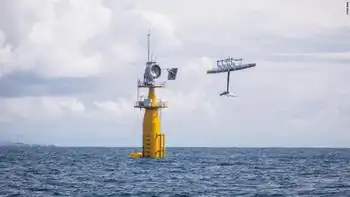London Gateway Unveils World’s First All-Electric Berth

High Voltage Maintenance Training Online
Our customized live online or in‑person group training can be delivered to your staff at your location.

- Live Online
- 12 hours Instructor-led
- Group Training Available
London Gateway All-Electric Berth enables shore power and cold ironing for container ships, cutting emissions, improving efficiency, and supporting green logistics, IMO targets, and UK net-zero goals through grid connection and port electrification.
Key Points
It is a shore power berth supplying electricity to ships, cutting emissions and costs while boosting port efficiency.
✅ Grid connection enables cold ironing for container ships
✅ Supports IMO decarbonization and UK net-zero goals
✅ Stabilizes energy costs versus marine fuels
London Gateway, one of the UK’s premier deep-water ports, has unveiled the world’s first all-electric berth, marking a significant milestone in sustainable port operations. This innovative development aims to enhance the port's capacity while reducing its environmental impact. The all-electric berth, which powers vessels using electricity, similar to emerging offshore vessel charging solutions, instead of traditional fuel sources, is expected to greatly improve operational efficiency and cut emissions from ships docking at the port.
The launch of this electric berth is part of London Gateway’s broader strategy to become a leader in green logistics, with parallels in electric truck deployments at California ports that support port decarbonization, aligning with the UK’s ambitious climate goals. By transitioning to electric power, the port reduces reliance on fossil fuels and significantly lowers carbon emissions, contributing to a cleaner environment and supporting the maritime industry’s transition towards sustainability.
The berth will provide cleaner power to container ships, enabling them to connect to the grid while docked, similar to electric ships on the B.C. coast, rather than running their engines, which traditionally contribute to pollution. This innovation supports the UK's broader push for decarbonizing its transportation and logistics sector, especially as the global shipping industry faces increasing pressure to reduce its carbon footprint.
The new infrastructure is expected to increase London Gateway’s operational capacity, allowing for a higher volume of traffic while simultaneously addressing the environmental challenges posed by growing port activities. By integrating advanced technologies like the all-electric berth, and advances such as battery-electric high-speed ferries, the port can handle more shipments without expanding its reliance on traditional fuel-based power sources. This could lead to increased cargo throughput, as shipping lines are incentivized to use a greener, more efficient port for their operations.
The project aligns with broader global trends, including electric flying ferries in Berlin, as ports and shipping companies seek to meet international standards set by the International Maritime Organization (IMO) and other regulatory bodies. The IMO has set aggressive targets for reducing greenhouse gas emissions from shipping, and the UK has pledged to be net-zero by 2050, with the shipping sector playing a crucial role in that transition.
In addition to its environmental benefits, the electric berth also helps reduce the operational costs for shipping lines, as seen with electric ferries scaling in B.C. programs across the sector. Traditional fuel costs can be volatile, whereas electric power offers a more stable and predictable expense. This cost stability could make London Gateway an even more attractive port for international shipping companies, further boosting its competitive position in the global market.
Furthermore, the project is expected to have broader economic benefits, generating jobs and fostering innovation, such as hydrogen crane projects in Vancouver, within the green technology and maritime sectors. London Gateway has already made significant strides in sustainable practices, including a focus on automated systems and energy-efficient logistics solutions. The introduction of the all-electric berth is the latest in a series of initiatives aimed at strengthening the port’s sustainability credentials.
This groundbreaking development sets a precedent for other global ports to adopt similar sustainable technologies. As more ports embrace electrification and other green solutions, the shipping industry could experience a dramatic reduction in its environmental footprint. This shift could have a cascading effect on the wider logistics and supply chain industries, leading to cleaner and more efficient global trade.
London Gateway’s all-electric berth represents a forward-thinking approach to the challenges of climate change and the need for sustainability in the maritime sector. With its ability to reduce emissions, improve port capacity, and enhance operational efficiency, this pioneering project is poised to reshape the future of global shipping. As more ports around the world follow suit, the potential for widespread environmental impact in the shipping industry is significant, providing hope for a greener future in international trade.











